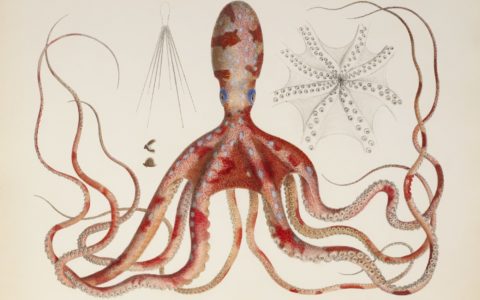250th Anniversary of the birth of Alexander von Humboldt
Librarian Will Beharrell celebrates the 250th birthday of Alexander von Humboldt, a giant of nineteenth century science
Published on 14th September 2019
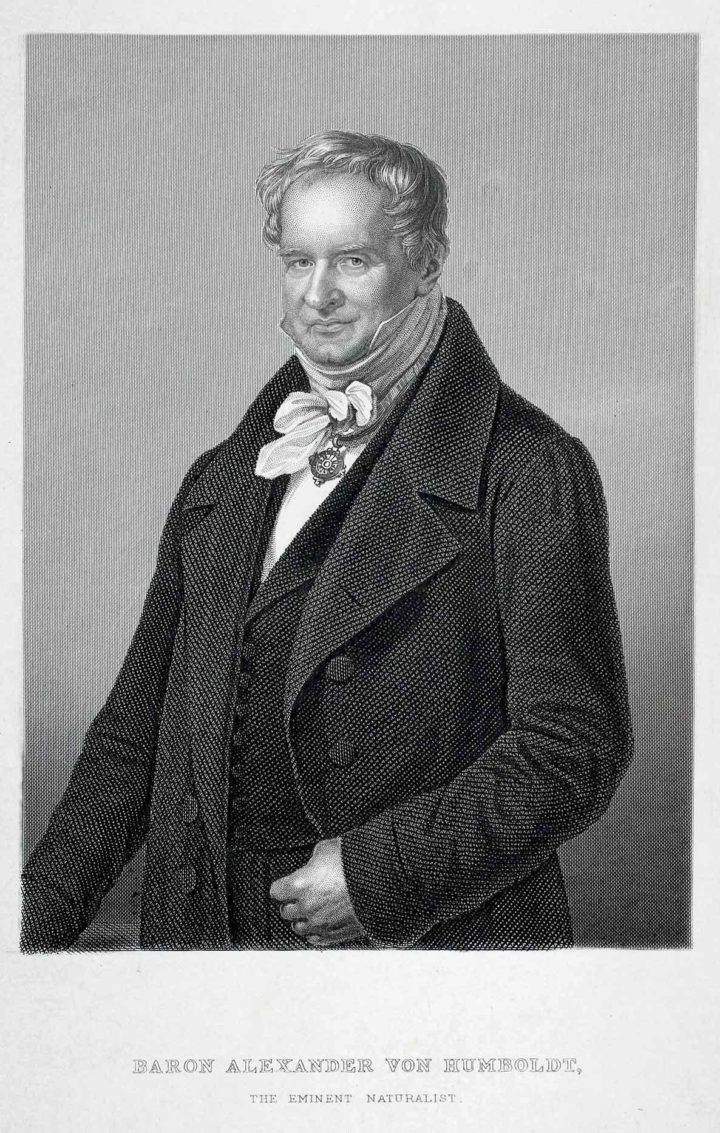
Alexander von Humboldt, born on this day 250 years ago, was a giant of early 19th century science. A prodigious traveller, geographer, and naturalist, his work had a profound effect on Charles Darwin and Alfred Russel Wallace (whose richly annotated Life of Alexander von Humboldt resides in our Library), and his thinking would continue to influence scientific, literary and philosophical discourse for centuries after his death.
And yet, Humboldt does not enjoy the kind of posthumous fame granted to other exalted scientists. Every British school child knows the names of Newton, Darwin, and Einstein, but Humboldt’s place in the public imagination is much less prominent. Those who know the name at all might associate it with the Berlin university (actually named for his older brother Wilhelm), the Californian county (and its beautiful, eponymous bay), or the charismatic South American penguin.
This relative lack of recognition is surprising given the scale of Humboldt’s achievement, and the extent of his fame in his own lifetime. By the 1820s, Humboldt was one of the most famous men in Europe, fêted by governments and learned societies around the world (including our own Linnean Society, who elected him a Foreign Member on 5 May 1818). Meanwhile, his scientific contribution was formidable. His early travels in South and Central America constitute the first scientific survey of the region by a Western observer. His observation that the coasts of eastern South America and western Africa appear to tesselate would inform the theory of continental drift. And he holds the dubious honour of being the first man to describe the phenomenon of human-induced climate change (and to suggest a cause).
Perhaps his reputation as an inspiring patron to others masked his own accomplishments. Many seeds planted by Humboldt would be coaxed into flower by others. Darwin’s travels in South America, directly informed by Humboldt’s own travelogues, would “rediscover” that continent for a new generation of Europeans; the theory of continental drift would not achieve widespread acceptance until the mid-20th century; and man’s role in the changing climate, and our responses to it, continue to be a source of bitter debate some 160 years after his death.
This radical, prescient streak in Humboldt’s thinking can be traced back to his earliest years. Born into an affluent and upwardly mobile Prussian family, Humboldt’s childhood was nonetheless an unhappy one. Humboldt’s mother was cold and emotionally absent, and made up for her lack of affection by providing the finest liberal education available to a 19th-century aristocrat. A succession of esteemed tutors would instil in the boys a love of literature, languages, mathematics, and philosophy. Above all, the young Humboldts were taught the enlightenment values of reason and truth as the building blocks of prosperity and liberty. These intellectual tools, married to an enquiring mind and considerable ambition (“I shall conquer the world, but with my head!”), would lay the foundation for his polymath interest in the natural world.
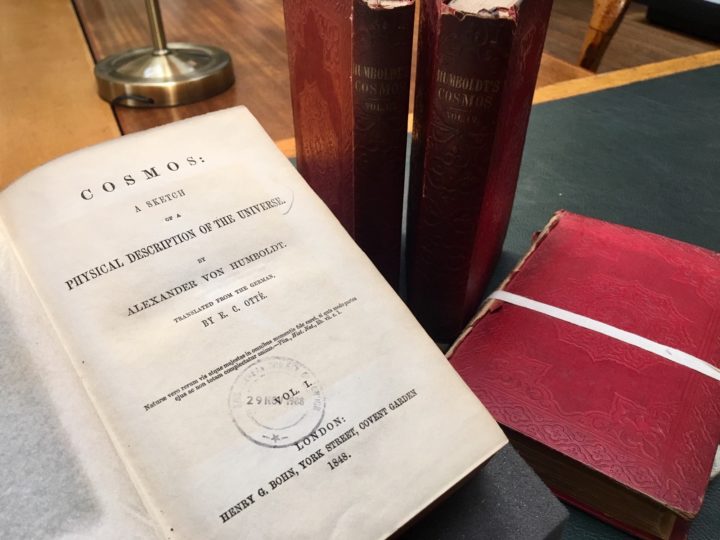
Alexander von Humboldt's Cosmos (published by Henry G. Bohn in 1848)
This interest would find its most enduring expression in Humboldt’s monumental, five-volume Cosmos (of which the Linnean Library possesses the first English-language edition, published by Henry G. Bohn in 1848). In this treatise, which remains influential to this day, Humboldt attempted to draw his many areas of enquiry into a single account of the known universe: “the assemblage of all things in heaven and earth, the universality of created things constituting the perceptible world”. Impossible tasks, of course, but the grandeur of Humboldt’s ambition, and the persuasiveness of his writing, remain compelling.
Cosmos was a huge success, further enhancing Humboldt's already considerable fame. Its publisher claimed, perhaps self-servingly, that...
The demand is epoch-making. Book parcels destined for London and St. Petersburg were torn out of our hands by agents who wanted their orders filled for the bookstores in Vienna and Hamburg.
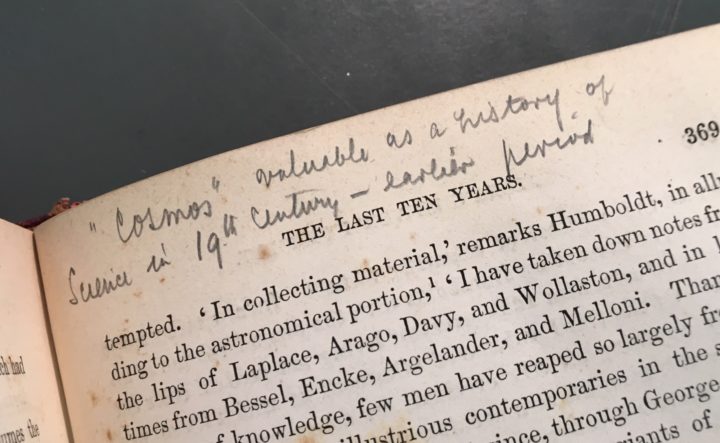
Alfred Russel Wallace annotation found in The Life of Alexander von Humboldt
Humboldt’s relationship to our own Carl Linnaeus was mixed. His holistic view of the natural world as a set of interlinked and overlapping magisteria seemed at odds with Linnaeus’s instinct to classify and compartmentalize. Moreover, Linnaeus’s contention that “all things [in nature] are made for the sake of man” (a sentiment cribbed from Aristotle) sat uneasily with Humboldt’s view of man as an ecological agent in his own right, a part of the landscape rather than something removed from it.
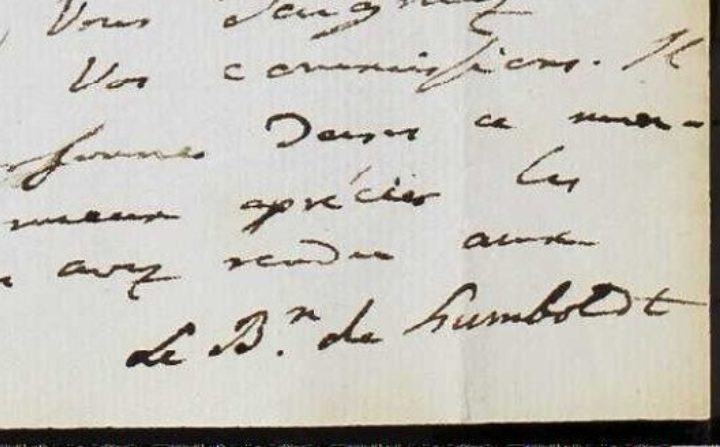
Baron Alexander von Humboldt's signature from one of his letters to Sir James Edward Smith
Nonetheless, Humboldt maintained friendly links with the Society that bears Linnaeus’s name. He corresponded with our founder, James Edward Smith (with a number of letters preserved in the archive) and, as previously noted, was sufficiently esteemed to be made a Foreign Member in 1818. Perhaps his most enduring footprint at the Linnean, however, is in the influence he wielded among the Fellowship, both in his lifetime and in subsequent decades. Wallace’s copy of Humboldt’s biography, black with marginal annotations, is a small testament to his enduring influence.
On this, the anniversary of his birth, we have an opportunity to reflect on that legacy. In his own words...
It is not in general until a man is dead and buried that the world begins to discuss what he has believed and what he has not believed.
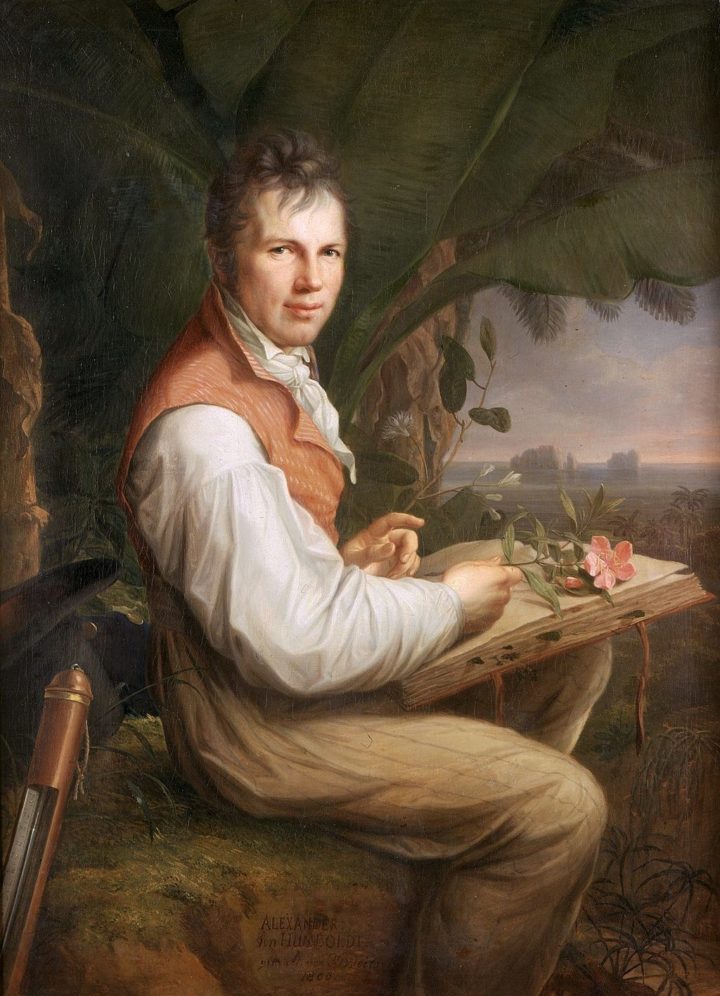
Portrait of Alexander von Humboldt © Wikimedia commons
By Will Beharrell, Librarian
